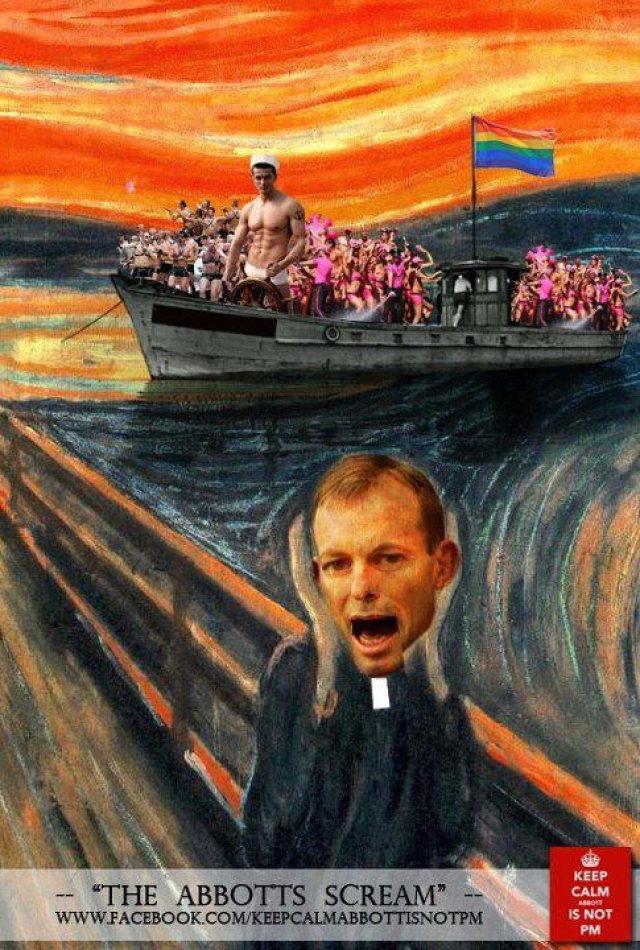
What would Australia look like if Tony Abbott became the next prime minister?
The Liberal leader is an outspoken climate denier, a hardliner on locking out refugees, determined to crack down on union and workers’ rights and wants to extend racist and draconian attacks on Aboriginal rights.
Yet polls have consistently shown Abbott and the Coalition far ahead of the Julia Gillard Labor government, whose pro-business policies and internal scandals have made it deeply unpopular.
Abbott’s unscientific rhetoric on climate change wildly swings between saying it is “absolute crap” and the science is “far from settled” to claiming it's a natural phenomenon unrelated to greenhouse gas emissions. The Coalition’s unofficial policy on climate change is to do nothing. Officially, it has a “direct action” carbon reduction policy.
Environmentalists have panned Abbott’s direct action policy as a big handout to polluters. It shares the same ineffectual reduction target as Labor: 5% emissions cuts by 2020. But instead of a business-friendly carbon price, Abbott would offer big polluters taxpayer-funded “incentives” to cut emissions yet would apply no sanctions on even the worst industries.
Under an Abbott government, Australia’s emissions would continue to rise. It is a worse-than-nothing plan in the face of runaway climate change.
Despite some opportunistic remarks meant to appease worried farmers, Abbott also backs coal seam gas mining, saying it is not as “devastating” as open-cut coalmining.
However, even as the urgency of action on climate change continues to grow, the Coalition remains focused on using the race card to manipulate Australian politics.
Abbott’s dangerous “stop the boats” tirade against refugees has been amplified even as the Labor government makes minor concessions to the public’s growing criticisms of long-term detention.
His policy plans for asylum seekers arriving by boat go beyond even what John Howard and Phillip Ruddock managed to achieve with the “Pacific solution”.
He said in January: “It is time for Australia to adopt turning the boats as its core policy.”
He said in an April 27 speech to the Institute of Public Affairs: “On my first day as prime minister, I would pick up the phone to the President of Nauru ... to reopen the detention centre there.”
He said “within a week” he would go to Indonesia, liken refugees to drug trafficking and push Indonesia into tougher persecution of people smugglers.
He would order the Australian navy to have boats carrying asylum seekers “turned around and escorted back to Indonesian waters”.
Abbott would reintroduce “temporary protection” visas and “there would be a presumption against refugee status for boat arrivals”.
An Abbott government would ramp up the persecution of so-called people smugglers with tougher minimum sentences and non-parole periods.
In January, Abbott said of Canberra’s Aboriginal Tent Embassy that it was “time to move on”. But this only hints at his deep-going plans to attack Aboriginal people and their communities.
There has always been bipartisan support between the Liberal and Labor parties on the Northern Territory intervention, led by John Howard in 2007. Labor has expanded many of the intervention’s worst measures, including income quarantining, attacking Aboriginal schooling and introducing widespread alcohol prohibition. It has introduced laws to entrench the intervention for a further 10 years.
But Abbott has argued to begin a so-called “second intervention” against Aboriginal communities, including putting the army back in charge: because “there's something about the military”.
He said in April last year that parents in Aboriginal communities should be fined if their children don't attend school, rather than the “cumbersome” punishment of cancelling welfare payments. The police would also be tasked with “rounding kids up in the morning to go to school”, the Age reported.
“I think a lot more is needed,” he said. Abbott favours the schooling model of anti-welfare campaigner Noel Pearson, which bids to force children into compulsory hearings for truancy, but does little to boost teacher numbers or training, or address the cultural issues.
Coalition policy also calls for abolishing the permit system for Aboriginal communities, which requires tourists and visitors to ask the locals for permission to enter the land.
Abbott would carry out these policies all while slashing welfare for the poor and cutting corporate tax rates even further.
His shadow treasurer, Joe Hockey, said in his March speech “The end of the age of entitlement” that social welfare was too wasteful in Australia. Unemployed and many poorer families are forced to live below the poverty line already, but Hockey said Australia should aim to be more like Hong Kong, which is one of the world’s most unequal places, with scant social security and low corporate tax.
Despite claiming the anti-union Work Choices laws are “dead and buried”, Abbott says there is a problem with “union militancy” and would push Labor's Fair Work Act — Work Choices lite — further to the right again, including watering down unfair dismissal laws even more.
But in recognition of the huge campaign against Work Choices that forced John Howard out of office in 2007, Abbott and the Coalition remain vague about their industrial relations policy.
Australian people can also expect an Abbott government to attack women's rights — especially reproductive and workplace rights — and make huge cuts to social spending, education and health.
But building an Abbott-proof fence cannot wait until an election is called, because many of Abbott’s far-right policies are shared by a Labor government committed to pandering to corporate interests, taking next-to-no action on climate change and persecuting refugees and Aboriginal people.
It has to start now, taking on the two big parties through every progressive and social movement in Australia, so that we can make the big decisions about the future we need.

Comments
Anonymous replied on Permalink
Anonymous replied on Permalink
Anonymous replied on Permalink
Anonymous replied on Permalink
Anonymous replied on Permalink
Anonymous replied on Permalink